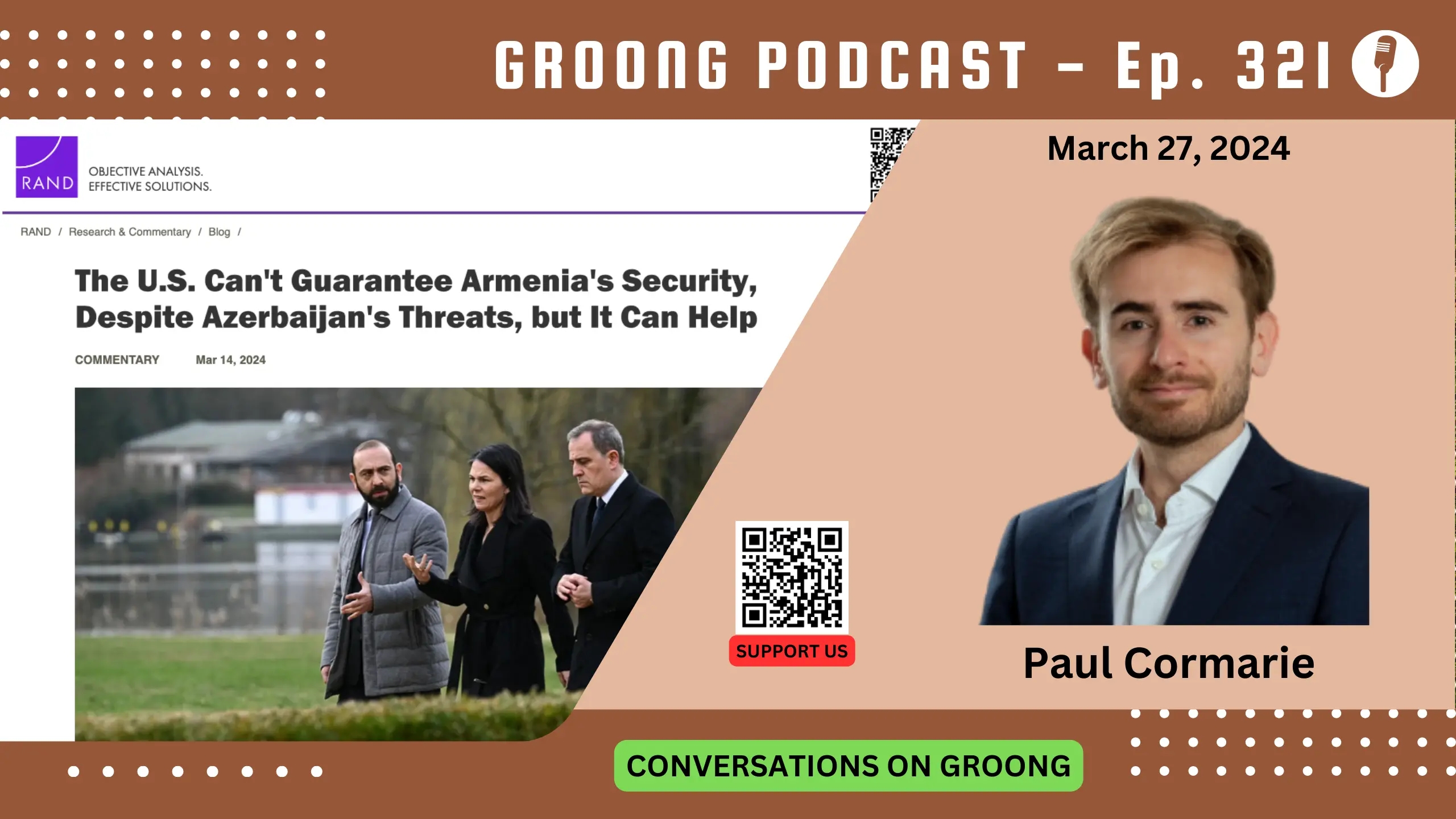
Groong Links:
Topics:
- US Strategic Interests in the South Caucasus
- The Challenge of Armenia’s Neighborhood
- Weaponry that could help Armenia
- Clear Expectations and Limits
- The Turkish Factor
- The Iranian Factor
Guest:
Episode 321 | Recorded: March 26, 2024
Show Notes
Can the US Guarantee Armenia’s Security?
Article Review
Paul, in your article you ask “should the United States even care about what happens in the South Caucasus”? And your first-look response is that no, there’s no strategic value for the US. Then you dig a little deeper and you posit that “an invasion of Armenia by Azerbaijan would run counter to American interests”.
Questions:
- Can you explain why?
- What are America’s strategic interests and objectives in the South Caucasus?
Armenia has four neighbors: Iran, Georgia, Turkey and Azerbaijan. As long as Iran and the West are in conflict, no western support can reach Armenia through it. Azerbaijan and Turkey are the actual threats that we’re trying to mitigate, so no western support will reach Armenia through them. And Georgia is deeply reliant on Turkey and Azerbaijan in many aspects, so Armenians do not believe that it can be a reliable corridor for external support in a time of need, such as when a war breaks out.
Questions:
- So if the US truly wants to supply weapons to Armenia that would really matter, and that could potentially be used against Azerbaijan or even Turkey, how would it do this given these geographic limitations?
- You note that “The United States should provide Armenia with the capabilities to defend itself, while setting clear expectations about the limits of its commitments.” What are those limits, and what should be the clear expectations?
Speaking of clear expectations and limits, after the defeat in the 44-day war, Pashinyan’s government has acted like a shell-shocked entity unable to wield an army, paralyzed by the fear of an Azeri attack. Pashinyan has acted as if allies should be fighting Armenia’s wars. Russians have said they can’t be more Armenian than Armenians; Iran has said they can’t be more Armenian than Armenians.
Questions:
- Do you think the Russians and/or the CSTO failed to set limits and define clear expectations for Pashinyan?
- Or is Pashinyan being disingenuous and trying to scapegoat them and blame his war losses on someone else?
You suggest that to complement procurements from France and India, the US should supply Armenia with MANPADS as well as TROPHY countermeasure systems. You further added: “arms exports to Armenia also could include broader counter-drone systems currently in development”.
Questions:
- Can you tell us the principles that went into these specific recommendations? For instance, why MANPADS specifically? Is this something that you assess the Armenian armed forces as lacking, and that they need?
- On the topic of French radars and air defense systems, is the quantity that is being procured and supplied of any significance? It seems that the number of batteries supplied can be counted on one hand and this would be the first thing taken down during a wide scale first strike?
Since the war, Pashinyan has replaced the entire General staff with his loyalists to prevent a military uprising, and between 2021 and 2023 the armed forces have shown no resilience or fighting capability.
Questions:
- Do you have a general assessment about the current state of Armenia’s defense forces?
- Note: it has been 5 years that Pashinyan’s administration keeps touting “military reforms”. Are you aware of any upgrade of the forces?
One of the natural vulnerabilities of Armenia is that its communication with the external world over land is limited. For instance, the main internet cable Armenia uses goes through Georgian territory and is owned by an Azerbaijani entity. In the case of the war in Ukraine, we have seen the west supply Ukraine with communications equipment, even commercial ones such as Starlink satellite dishes.
** Questions:**
- Do you think that the US can help strengthen the resilience of Armenia’s civilian and even defense communications infrastructure?
- In the military domain, are there high-tech communications technologies that can help improve the command & control capacity of Armenia’s armed forces?
Turkish Factor
In your article you say that the US state department could help neutralize the threat from Turkey by helping normalize Turkey-Armenia relations and acting as a mediator in that process.
Yet we know that Turkey has put forth preconditions that Turkish-Armenian normalization hinges on fulfilling Azerbaijani demands. At the same time, we know that Turkey itself has had historic problems related to Armenia supporting international efforts towards the recognition of the Armenian Genocide. And we’re not even mentioning the fact that most analysts whom we talk to believe that the so-called “Zangezur Corridor” project is mainly backed and promoted by Turkey.
Questions:
- Do you think it’s realistic to expect that the US could foster a more positive stance by Turkey towards Armenia presently, when Armenia is at its weakest, given these historic positions and preconditions by Turkey?
You note that more countries have taken up the call to support Armenia, such as France and India. You also note that none of these highly publicized military purchases, and also US security assistance, will make an overnight difference in deterring the imminent danger of Azerbaijan, which is aggressively supported by Turkey. There are some assessments that predict that in the next war, this time in Armenia, Turkey could be involved directly instead of through proxy forces.
Questions:
- How can the US deter such a role by Turkey in a future conflagration? Can it introduce additional rules preventing the use of US-made high tech weapons in an attack against Armenia? And would such rules actually be effective?
- We have seen Canada impose such rules on its export of drone parts for the Turkish Bayrakdars, but following some NATO/Sweden negotiations, those export bans are being lifted. Also, it may be a simple thing for Turkey to ignore the rules “temporarily”, create new realities on the ground and then apologize for them. Can the US actually stop Turkey from such belligerence?
Iran Factor
After the 2020 war, Iran articulated its red lines indicating that it will not tolerate any geopolitical changes in the region and has emphasized the integrity of its border with Armenia. Out of all regional powers that have the required capabilities, analysts claim that Iran is the most incentivized in sustaining Armenia’s territorial integrity.
Analysts claim that Armenia has refused advances from Iran in terms of supplies of drones and other weaponry as well as offers to do joint military exercises because of concerns about Western sanctions.
Questions:
Do you think that Armenia could be a region where the US and Iran, instead of being adversaries, can potentially cooperate militarily, similar to Syria? Could the US tolerate, for instance, Iranian drones in Armenia as well as joint military exercises?
**Background: **You write that “an invasion also could further destabilize the region and upend critical energy flows that America’s NATO allies are increasingly dependent on as they wean themselves off Russian supplies.” In reality, Azerbaijan has barely 5-10% of Russia’s capacity, and most of the oil and gas getting to Europe through the Azeri-Turkish pipelines is essentially rebranded Russian export, since the sanctions were imposed on Russia for the war in Ukraine.
Wrap-up
All right, that’s our show, we hope you found it useful. Please find us on Social Media and follow us everywhere you get your Armenian news.
Thanks to Laura Osborn for the music on our podcasts.
Guests

Paul Cormarie
Paul Cormarie is a policy analyst in RAND’s Washington D.C. office. His research focuses on NATO and European defense policy, force planning, and security cooperation. He is also a CSIS Nuclear Scholar where he is currently conducting research on European deterrence. Previously, Cormarie was a Researcher at the NATO Parliamentary Assembly, where he wrote reports on the Alliance and in other topics related to European security. Prior to these roles, he has also been affiliated with CSIS, Atlantic Council, the EU Delegation to the United States, and the United Nations. Cormarie holds a M.Sc. in Foreign Service from Georgetown University.
Hosts

Hovik Manucharyan
Hovik Manucharyan is an information security engineer who moved from Seattle to Armenia in 2022. He co-founded the ANN/Groong podcast in 2020 and has been a contributor to Groong News since the late 1990s.
Disclaimer: The views expressed by Hovik Manucharyan on the ANN/Groong podcast are his own and do not necessarily reflect the opinions of his employer or any other organization.

Asbed Bedrossian
Asbed is founder of the Armenian News Network Groong and co-founder of the ANN/Groong podcast.